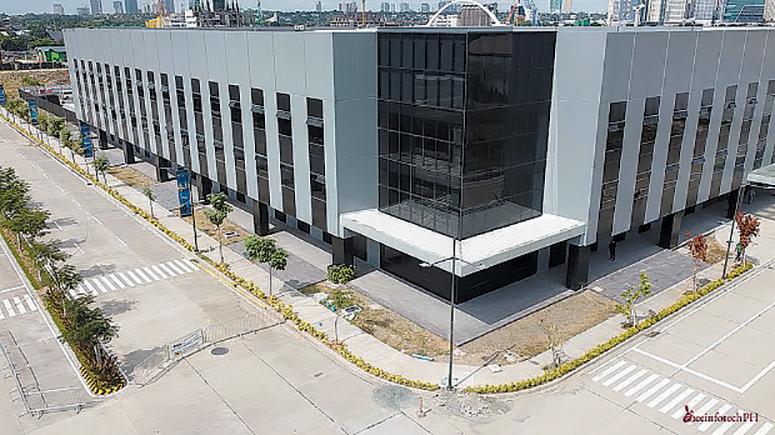Colliers Philippines is seeing a growing interest in data centers in the country. In our view, this should be sustained by the continued rise of e-commerce transactions, emergence of smart cities, proliferation of cloud computing technologies, need for 5G connectivity, increasing financial inclusion, and the government’s push to digitize its processes. We encourage developers of industrial parks to take a proactive stance in cornering demand from data center operators. In our opinion, the conversion of brownfield assets should also be considered. Looking forward, we believe that joint ventures will be a popular route among foreign and local players. Stakeholders should maximize fiscal and non-fiscal incentives provided by the government.
What are data centers?
Data centers are physical facilities used by enterprises to digitally house their critical business applications and information. Data centers are designed based on a complex network that allows shared access to the applications and data. According to Cisco, a data center is composed of routers, switches, firewalls, storage systems and servers.
Philippine data center market overview
The Philippines is considered one of the largest early adopters of digital technology, be it for social media, e-commerce, education, and financial services. With the large tracts of data needed to effectively optimize the exchange of information, the Philippines is now being touted as the next viable destination for data center operations in Southeast Asia.
Business transformation in the last two years has pushed organizations to embrace digitization. This shift has boosted the demand for data centers globally. Data from Arizton, an advisory and intelligence firm, show that global data center investment market size reached $215.8 billion (P11.2 trillion) in 2021 and is expected to reach $288.3 billion (P15.5 trillion) by 2027.

According to Arizton, in 2021, investments in the sector reached $298 million (P15.5 billion). Most data centers in the Philippines are owned by telecommunications companies, including Globe and ePLDT. Recently, more local and international players have invested in the domestic data center market including Converge ICT, DITO Telecommunity, Beeinfotech, Alibaba, YCO Cloud Centers, and SpaceDC. While Metro Manila is the primary hub for data centers in the Philippines, we have seen data center operators expanding in provincial locations including Cavite, Cebu, and Davao.
Recommendations
1. Highlight perks of locating in industrial parks
We believe that demand for data centers will likely influence industrial space absorption in the Philippines. Industrial parks should be preferred by most data center operators because these are already built with redundancy in mind, with multiple power and utility providers to support data center uptime. Developers should highlight other features of industrial parks such as the potential for customization and subsidized utility costs including electricity.

In our view, the Cavite–Laguna–Batangas (CALABA) corridor will be a popular option for investors as it is home to the majority of the country’s industrial parks. Existing data centers in CALABA include Globe in Gateway Business Park in Cavite. Meanwhile, planned developments include YCO Cloud Centers in Light Industry & Science Park IV (LISP IV) in Malvar, Batangas, and PLDT’s 100MW data center facility in Sta. Rosa, Laguna, through its ICT arm ePLDT.
Data center operators may also consider industrial spaces in Northern Luzon. In our view, demand for data center facilities in areas such as New Clark City and Tarlac remains underserved.
2. Take advantage of fiscal incentives
Data center operators planning to expand in the Philippines should take advantage of the recently enacted Corporate Recovery and Tax Incentives for Enterprises (CREATE) Law, which provides incentives including lower taxes for imported capital equipment and raw materials. Additionally, the government has approved the Strategic Investment Priority Plan (SIPP), the country’s list of priority industries entitled for tax incentives under the CREATE Law. According to the Board of Investments (BOI), data centers are among the industries listed in the SIPP and, therefore, are eligible for incentives. The country also has laws such as the Cybercrime Prevention Act of 2012 and Data Privacy Act which ensures data protection and ownership.
3. Enter joint venture agreements
Colliers has seen data center operators partnering with local firms for the establishment of their facilities in the Philippines.
Foreign firms planning to set up their operations in the Philippines can take advantage of local firms’ real estate assets and familiarity with the domestic market. The local partner can also deal with suppliers, as well as construction and other related business permits.
Cloud computing and e-commerce fueling demand
Cloud computing and storage are among the primary global drivers of data center development. Due to increasing remote work in the last two years, companies have started migrating their data and critical information to the cloud. A survey by Alibaba Cloud in 2020 showed that about 94 percent of respondents in the Philippines see cloud-based technologies as an important business factor post-COVID-19. The survey also revealed that 51 percent of respondents have adopted cloud-based technology solutions for their businesses. Cloud computing companies planning to set up operations in the Philippines include Alibaba Cloud located in Manila and YCO Cloud Centers in Malvar, Batangas.
In our view, the outsourcing sector should also buoy the demand for cloud services as BPO companies continue to implement a hybrid work model and subscribe to the cloud computing model. Data from the IT and Business Process Association of the Philippines (IBPAP) show that as of 2021, there are about 700 BPOs employing about 1.4 million workers in the country.
In our view, the government’s push to automate processes and further integrate services should contribute to an increase in demand for both cloud computing and data center services. In June 2020, the Department of Information and Communications Technology (DICT) introduced the Cloud First Policy, which promotes cloud computing as the preferred technology for government administration and services.
The uptick in e-commerce utilization has also raised the interest in data center operations. In 2021, data from Google, Temasek, and Bain & Co. show that the Philippines’ e-commerce Gross Merchandise Value (GMV) grew by 24 percent YOY. This is the highest growth among major Southeast Asian economies during the period.
We believe that the imposition of strict lockdowns has accelerated consumers’ preference for online shopping. The Department of Trade and Industry (DTI) projects the number of domestic online businesses to reach one million in 2022 from 500,000 in 2020. E-commerce sales are also projected to reach $12 billion (P624 billion) in 2025 from $3.6 billion (P187.2 billion) in 2020. In our opinion, the surge of data from online shopping and e-payment systems is provoking the need for more data centers. The massive usage of social media should also support growth of data demand in the Philippines. (To be continued)
